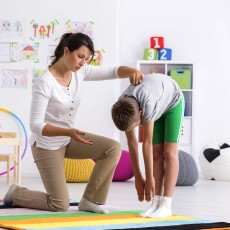
Juvenile Arthritis
Also called: Childhood arthritis, JRA, Juvenile idiopathic arthritis, Still's disease
MEDICAL ENCYCLOPEDIA
National Institutes of Health
Juvenile arthritis (JA) is arthritis that happens in children. It causes joint swelling, pain, stiffness, and loss of motion. It can affect any joint, but is more common in the knees, hands, and feet. In some cases it can affect internal organs as well.
The most common type of JA that children get is juvenile idiopathic arthritis. There are several other forms of arthritis affecting children.
One early sign of JA may be limping in the morning. Symptoms can come and go. Some children have just one or two flare-ups. Others have symptoms that never go away. JA can cause growth problems and eye inflammation in some children.
No one knows exactly what causes JA. Most types are autoimmune disorders. This means that your immune system, which normally helps your body fight infection, attacks your body's own tissues.
JA can be hard to diagnose. Your health care provider may do a physical exam, lab tests, and x-rays. A team of providers usually treats JA. Medicines and physical therapy can help maintain movement and reduce swelling and pain. They may also help prevent and treat complications.
NIH: National Institute of Arthritis and Musculoskeletal and Skin Diseases
- ANA (Antinuclear Antibody) Test
 (National Library of Medicine)Also in Spanish
(National Library of Medicine)Also in Spanish - Joint Aspiration (Arthrocentesis) (Nemours Foundation)
- Rheumatoid Factor (RF) Test
 (National Library of Medicine)Also in Spanish
(National Library of Medicine)Also in Spanish
- Treatment Plan Adherence for Your Child With JA (Arthritis Foundation)
- What Is a Pediatric Rheumatologist? (American Academy of Pediatrics)Also in Spanish
- What People with Rheumatoid Arthritis Need to Know about Osteoporosis
 (National Institute of Arthritis and Musculoskeletal and Skin Diseases)
(National Institute of Arthritis and Musculoskeletal and Skin Diseases)
- Juvenile Spondyloarthritis: An Overview (Spondylitis Association of America)
- Genetics Home Reference: juvenile idiopathic arthritis
 (National Library of Medicine)
(National Library of Medicine)
- Arthritis by the Numbers: Book of Trusted Facts & Figures (Arthritis Foundation) - PDF
- ClinicalTrials.gov: Arthritis, Juvenile
 (National Institutes of Health)
(National Institutes of Health)
- Article: Juvenile Idiopathic Arthritis for the Pediatric Orthopedic Surgeon.
- Article: The clinical presentation in adulthood of juvenile idiopathic arthritis.
- Article: Unveiling the Efficacy, Safety, and Tolerability of Anti-Interleukin-1 Treatment in Monogenic...
- Juvenile Arthritis -- see more articles
- Arthritis Glossary (Arthritis Foundation) - PDF
- Find a Rheumatologist (American College of Rheumatology)
- National Institute of Arthritis and Musculoskeletal and Skin Diseases
 Also in Spanish
Also in Spanish
- Juvenile Idiopathic Arthritis (Nemours Foundation)Also in Spanish
- Juvenile rheumatoid arthritis (Medical Encyclopedia)Also in Spanish





















.png)












No hay comentarios:
Publicar un comentario